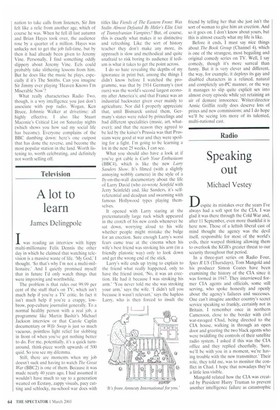Speaking out
Michael Vestey
Despite its mistakes over the years I've always had a soft spot for the CIA. I was glad it was there through the Cold War and, after 11 September, even more thankful it is here now. Those of a leftish liberal cast of mind thought the agency was the devil itself, responsible for most of the world's evils, their warped thinking allowing them to overlook the KGB's greater threat to our security throughout that period.
In a three-part series on Radio Four, Spies R US (Thursdays), Tom Mangold and his producer Simon Coates have been examining the history of the CIA since it was formed in 1947. They interviewed former CIA agents and officials, some still serving, who spoke honestly and openly about the agency's failures and successes. One can't imagine another country's secret service speaking so frankly, certainly not in Britain. I remember once in northern Cameroon, close to the border with civil war-ravaged Chad, being directed to the CIA house, walking in through an open door and greeting the two black agents who were twiddling the controls of their satellite radio system. I asked if this was the CIA office and they replied cheerfully, 'Sure, we'll be with you in a moment, we're having trouble with the new transmitter.' Their role, they told me, was to monitor the conflict in Chad. I hope that nowadays they're a little less visible.
Mangold related how the CIA was created by President Harry Truman to prevent another intelligence failure as catastrophic as Pearl Harbor and to counter the postwar Soviet threat. It was badly caught out over 11 September. One former officer said the CIA became so dependent on sophisticated surveillance technology that it didn't develop its network of agents in the field and became language-shy, or what Mangold described as not hosing themselves down in the languages and cultures of the countries it was involved in. Has it changed? he asked the officer. No, came the reply.
It has in a few ways. It has now adopted a paramilitary role and been given a licence to kill those who attack Americans abroad. It also co-operates more actively with foreign intelligence services and has been frantically recalling retired agents, caserunners and interrogators. The need to penetrate al-Qa'eda is paramount though one hopes it is not too late. Until 11 September it failed to assess the rise of extreme Islamic terror despite the bombing of the World Trade Center in 1993, attacks on US soldiers in Lebanon and US embassies in East Africa and the bombing of a US warship in the port of Aden. The invasion of Afghanistan can be counted as a success as CIA agents paid off rival warlords with cash which contributed to the defeat of the Taleban.
The Cold War narrowed the vision of the CIA and the politicians on Capitol Hill. As Mangold revealed, everything was seen through the prism of the Cold War to prevent Soviet expansion. A worthy aim but it failed to see that the installation of the Shah and the removal in a US-led coup of a popular radical nationalist leader would create hostility. The CIA didn't analyse the opposition that was growing. The US then thought only of oil and Iran as a useful platform from which to spy on the Soviet Union.
It is not always easy to predict world events as politicians have learned to their cost. The CIA was surprised by the Soviet invasion of Czechoslovakia in 1968 and earlier had misread Hungary in 1956. However, according to another former officer, the CIA's advice on Vietnam was ignored by US administrations, that these little people in pyjamas weren't just communists, they were nationalists too and that made them a more formidable and determined enemy as it proved.
As one speaker said, until Ronald Reagan arrived in the White House in 1981 every president thought of containing the Soviet Union and not losing the Cold War. Reagan said, 'I want to win it' and went on the offensive by deploying cruise and Pershing missiles in western Europe, setting in motion the Strategic Defence Initiative, the so-called Star Wars missile shield which I'm glad to see is making a comeback, and actively undermining the Soviet reach. What the CIA failed to spot, though, was the increasing paranoia of Moscow. KGB agents in Washington were horrified to receive a message from the Soviet leader Yuri Andropov saying they were now closer to war and instructing them to drive around Washington at night to see how many lights were burning at the Pentagon and State Department as this would be a sign of war-planning. I hope the staff remembered to turn the lights off when they went home. It was only eventual reassuring messages from, presumably, the White House that calmed Moscow. In all, this was a well-crafted, informative series of the kind one would expect from such a seasoned, experienced reporter as Mangold.



















































































 Previous page
Previous page